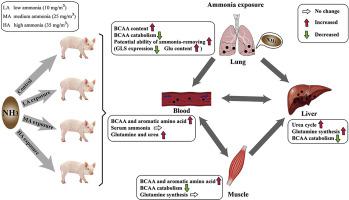Animal Nutrition ( IF 6.1 ) Pub Date : 2021-11-10 , DOI: 10.1016/j.aninu.2021.09.001 Guanya Li 1, 2 , Zhenglin Dong 1, 2 , Shusheng Yue 2 , Dan Wan 1, 2 , Yulong Yin 1

|
Accumulating evidence implicates that offspring are susceptible to paternal alterations in numerous fetal disorders, such as growth and metabolic defects. However, less study has been conducted to define the relationship between paternal zinc deficiency (ZnD) and energy metabolism of offspring. In the present study, we used a paternal ZnD exposure (Zn at 0.3 μg/g) model to test energy metabolism of male and female offspring with the intervention of diet type (high-fat diet and low-fat diet). Our results demonstrated that paternal ZnD decreased body weight (BW) gain per week (P < 0.01) and ME intake per week (P < 0.05) at 11 weeks in male offspring with high-fat diet intervention but not in female offspring. Further, anabolism and catabolism of hepatic energy products also exhibited alterations. ZnD attenuated liver glucose but increased lipids content accompanied with elevated adiponectin and reduction in leptin level in serum, which exhibited lipid metabolic disturbance and smaller ratio of liver weight to BW in male but not female offspring. The qRT-PCR and liver energy metabolites analysis revealed that paternal ZnD mainly induced reduction in glucose tolerance and lowered glucose uptaking ability in male offspring and thereby alleviated glycolysis and the tricarboxylic acid cycle (TCA) cycle, which displayed a male gender-dependency. Therefore, we propose that paternal ZnD abolishes metabolic effects in male offspring induced by diet type intervention. Our findings reveal a novel link between paternal Zn-D and offspring energy metabolism.
中文翻译:

父系缺锌消除了饮食类型诱导的后代代谢影响
越来越多的证据表明,后代在许多胎儿疾病(例如生长和代谢缺陷)中容易受到父亲改变的影响。然而,很少有研究来确定父系缺锌(ZnD)与后代能量代谢之间的关系。在本研究中,我们使用父系 ZnD 暴露(Zn 为 0.3 μg/g)模型在饮食类型(高脂饮食和低脂饮食)干预下测试雄性和雌性后代的能量代谢。我们的结果表明,父亲的 ZnD 降低了每周体重 (BW) 增加 ( P < 0.01) 和每周 ME 摄入量 ( P < 0.05) 在 11 周时,高脂饮食干预的雄性后代中,而雌性后代中则不然。此外,肝能量产物的合成代谢和分解代谢也表现出改变。ZnD降低肝葡萄糖但增加脂质含量,伴随血清中脂联素升高和瘦素水平降低,表现为雄性后代脂质代谢紊乱和肝脏重量与体重之比较小,而雌性后代则没有。qRT-PCR 和肝能量代谢物分析显示,父系 ZnD 主要诱导雄性后代的葡萄糖耐量降低和葡萄糖摄取能力降低,从而缓解糖酵解和三羧酸循环 (TCA) 循环,表现出雄性性别依赖性。所以,我们提出父系 ZnD 消除了由饮食类型干预引起的雄性后代的代谢影响。我们的研究结果揭示了父系 Zn-D 与后代能量代谢之间的新联系。









































 京公网安备 11010802027423号
京公网安备 11010802027423号